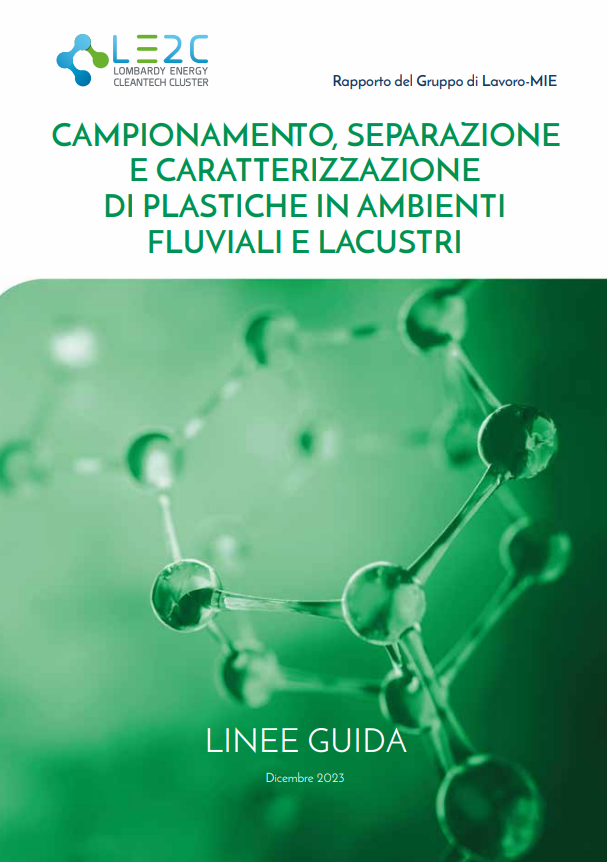The Emerging Micro Pollutants Working Group (GdL-MIE) presents guidelines addressing the presence of floating plastic particles in freshwater.
The Working Group on Emerging Micro Pollutants (GdL-MIE), founded in 2018 within the Lombardy Energy Cleantech Cluster - LE2C, is committed to the preparation of the Second Scientific Report which, 4 years after the publication of the first volume, will deepen the issues of the presence of emerging micropollutants and microplastics in the water with particular regard to analytical techniques, treatment and removal technologies in wastewater and the environmental and human risk associated with the presence of these pollutants.
As the first report of this phase of work, the GdL-MIE is pleased to publish a proposal for Guidelines for the monitoring of plastics (mico and beyond) present in surface waters. These guidelines, aimed at operators of the monitoring of water bodies, suggest simple but extremely rigorous criteria based on the long research activity developed by the University of Milan, Department of Biosciences, and have been prepared with the collaboration of experts relating to ARPA Lombardia, Sector Laboratories, U.O. Emerging Contaminants and U.O. Regional Laboratory Area Ovest, at the University of Brescia, Department of Mechanical and Industrial Engineering and at the Institute of Water Research, CNR, Secondary Headquarters of Verbania.
The GdL-MIE has seen the voluntary membership of 32 research bodies, universities and companies related to integrated water service and water treatment technologies. The shared goal of the GdL-MIE is to contribute to the definition of management strategies based on the synergy between academic knowledge and business experience.
OBJECTIVES AND STAGES OF THE GDL-MIE
In 2020 the GdL-MIE published the report “Emerging Pollutants”, which summarises the state-of-the-art picture of the presence of emerging pollutants in the aquatic compartments and in Lombard wastewater.
In 2022, the group embarked on a new phase focused on microplastics in aquatic environments. Three Sub-Working Groups (SdLs) are engaged in examining monitoring and analytical techniques, wastewater and drinking water technologies, and the environmental and human risk of pollutants in water.
In this context, the Monitoring and Analytical Techniques (SdL-MTA) Sub-Working Group presents 'Sampling, separation and characterisation of plastics in river and lake environments', an almost unique guide that aims to provide practical guidance even for non-specialists.
The document stems from the need to harmonise the different existing methodologies for taking samples from rivers and lakes in order to obtain a qualitative-quantitative characterisation of unitary floating plastic particles.
This guide aims not only to obtain scientific data, but also to ensure practical applicability, involving subjects outside of research organisations. Finally, the proposed methods consider the needs of stakeholders involved in the planning, regulation, management and utilisation of water resources.
Please note that the report is only available in Italian.
TO DOWNLOAD THE GUIDELINES, CLICK HERE.
AUTHORS
Andrea Binelli (Università degli Studi di Milano), Stafano Magni (Università degli Studi di Milano), Luisa Colzani (ARPA Lombardia), Maria Antonietta De Gregorio (ARPA Lombardia), Laura Depero (Università degli Studi di Brescia), Stefania Federici (Università degli Studi di Brescia), Silvia Galafassi (Istituto di Ricerca Sulle Acque, CNR-IRSA).
EDITORS
The edition of the volume was edited, on behalf of the Lombardy Energy Cleantech Cluster by Carmen Disanto (LE2C), Claudia Doria (LE2C), Gianni Tartari (LE2C), Giovanni Bergna (Lariana Depur).
acknowledgements
The volume was produced by LE2C and the GdL-MIE Experts who collaborated in the Sub-Working Group (SdL) 'Monitoring and Analytical Techniques' coordinated by:
- Andrea Binelli (Università degli Studi di Milano);
- Maria Boccuti (ARPA Lombardia);
- Sara Castiglioni (Istituto Ricerca Farmacologiche Mario Negri);
- Luisa Colzani (ARPA Lombardia).


 Italiano
Italiano